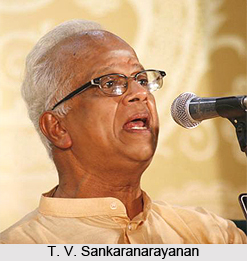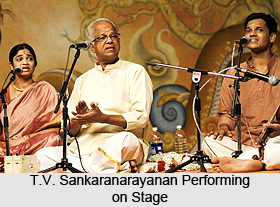 T.V. Sankaranarayanan (Tiruvalangadu Vembu Iyer Sankaranarayanan), the eminent classical singer, has a distinct approach of singing which usually echoes the style of his mentor and uncle, Madurai Mani Ayyar. T.V. Sankaranarayanan has a rich and vibrant voice that he exuberates with great zest and verve retaking beautiful phrases and `brikas` of his uncle. His voice has always awestruck the audiences during each and every execution of his. His classifiable style of Carnatic music renditions combined with unlike performance skills, astute phrasing aggrandized with effortless `prayogas`. His ad-lib swaraprastharas also came to contribute into his style of execution.
T.V. Sankaranarayanan (Tiruvalangadu Vembu Iyer Sankaranarayanan), the eminent classical singer, has a distinct approach of singing which usually echoes the style of his mentor and uncle, Madurai Mani Ayyar. T.V. Sankaranarayanan has a rich and vibrant voice that he exuberates with great zest and verve retaking beautiful phrases and `brikas` of his uncle. His voice has always awestruck the audiences during each and every execution of his. His classifiable style of Carnatic music renditions combined with unlike performance skills, astute phrasing aggrandized with effortless `prayogas`. His ad-lib swaraprastharas also came to contribute into his style of execution.
Early Life of T.V. Sankaranarayanan
T.V. Sankaranarayanan was born on March 7, 1945 at Mayiladuturai, Thanjavur district, to T.S. Vembu Ayyar. The world of music came to display its magic in front of him with the hands of his uncle Madurai Mani Ayyar. He was only nine years old when he started receiving training in music. At fifteen years of age, he got together with his father who was also disciple of Mani Ayyar. It was the 2nd day of February in the year 1968, when he made his debut as a Carnatic music vocalist with T. N. Krishnan on Violin, Vellore Ramabhadran on Mridangam and Alangudi Ramachandran on Ghatam. Apart from establishing himself in the world of music, T.V. Sankaranarayanan has also obtained graduation in commerce.
Career of T.V. Sankaranarayanan
 T.V. Sankaranarayanan became the inevitable landmark for each and every music series to make it complete. Thus he established a glorious field before him. It has been said that he possesses a natural instincts to probe, search for fresh fields of musical excellence and to imbibe the best in the art and strive to satisfy the elite and the lay among the musical enthusiasts. It was expected from T.V. Sankaranarayanan that he would bring his level best to reach the pinnacle of glory and arrive at the stature of the two stalwarts of his family. He represents exuberance in singing.
T.V. Sankaranarayanan became the inevitable landmark for each and every music series to make it complete. Thus he established a glorious field before him. It has been said that he possesses a natural instincts to probe, search for fresh fields of musical excellence and to imbibe the best in the art and strive to satisfy the elite and the lay among the musical enthusiasts. It was expected from T.V. Sankaranarayanan that he would bring his level best to reach the pinnacle of glory and arrive at the stature of the two stalwarts of his family. He represents exuberance in singing.
Through out his career he has executed in more than hundreds of concerts both in India and abroad. T.V. Sankaranarayanan has participated in the concert tours in USA and Canada in the year 1975 and 1981 respectively. In the year 1976, he conducted a concert in USA to his credit (Delivered the John Coltrane Memorial World Music Series Lecture at the IVY League, Dartmouth College, New Hampshire.) In the year 1984, he performed at Singapore and Malaysia. He has been considered to be one of the most cogent salesmen of Carnatic music.
Achievements of T.V. Sankaranarayanan
As recognition to the expertise of T.V. Sankaranarayanan he has been conferred many accolades. They are, Sangeetha Ratnakara by Vassar College, USA and Mid Hudson Music Circle in the year 1975; Innisai Perarasu by Bharati Kalamandram, Toronto, Canada in the year 1981; Gayaka Sikhamani by Bhairavi, Cleveland, USA in the year 1981; Swara Laya Ratnakara by Ramakrishnananda Saraswati of Sri Vidyasram, Rishikesh in the year 1986; Ganakalaratnam Conferred by Dr. Semmangudi Srinivasa Ayyar at a public function in the year 1987; Nadakanal by Nadakanal, Madras in the year 1987. Music Academy has acknowledged his talent four times for the years 1979-80, 80-81, 83-84, and 85-86. For the year 1986-87, he has been awarded by Indian Fine Arts Society, Madras Best Concert Award. T.V. Sankaranarayanan also was awarded Thulaseevanam Sangita Parishat S. Ramanathan Memorial Award for his outstanding contribution in the realm of music.




















